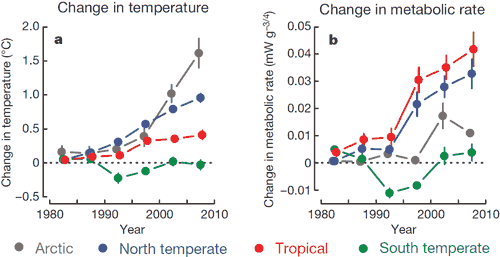
The effects of global warming are already being observed in animal species throughout the world. Creatures are breeding earlier and migrating to higher latitudes or altitudes to escape the warming temperatures (Parmesan 2003). As higher latitudes are warming faster than the tropics, one would expect the impact on species in high latitudes to be greater. However, a new study Global metabolic impacts of recent climate warming (Dillon et al 2010) turns this notion on its head. The study is based on the principle that metabolic rates of ectotherms (cold blooded animals) change faster at high temperatures than at low temperatures. The tropics are already that much warmer than the Arctic - hence warming goes a long way in the tropics.
Metabolic rate is a useful metric for an organism's energetic and material needs. As a creature's metabolic rate increases, so too does it's need for food and vulnerability to starvation unless food resources increase. Higher metabolic rate means reduced energy for reproduction and increased rates of evaporative water loss in dry environments. Thus metabolic increases should alter food web dynamics, leading to elevated rates of herbivory and predation, as well as changes in the spread of insect-borne tropical diseases.
Metabolism changes when temperature changes. However, a quirk of biology is that the metabolism change is greater at high temperature than at low temperature. Warming delivers "way more of a buzz" at higher temperatures. Since 1980, the Arctic has been warming around 3 times faster than the tropics. However, the increase in metabolism in the tropics is much greater, because tropical warming took place in an environment that was initially warmer. Warming during the past three decades has had its biggest absolute impacts on metabolic rates in tropical and north temperate zones.

Figure 1: Global changes in temperature and in metabolic rates since 1980.
a, Changes in mean temperature (5-year averages) for Arctic, North temperate, South temperate and tropical regions. b, Predicted absolute changes in mass-normalized metabolic rates by geographical region.
Why does this matter? The tropics are the centre of Earth’s biodiversity and its chief engine of primary productivity. The potential for large impacts is highest in the tropics because the biodiversity is the highest. Consequently, relatively large effects of temperature change on the metabolism of tropical species may have profound local and global consequences.
Posted by John Cook on Friday, 8 October, 2010
 |
The Skeptical Science website by Skeptical Science is licensed under a Creative Commons Attribution 3.0 Unported License. |